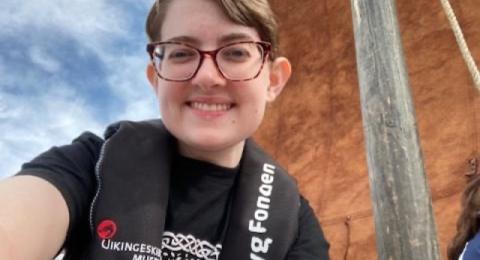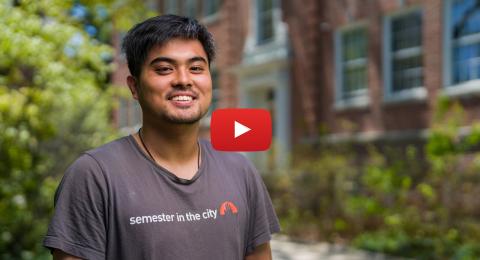The communication major at UNH is in the top 20% in the nation for good reason. Here you’ll study real-world political issues, news events, cultural phenomena, and human interaction within many contexts, both personal and professional. In addition to practical experience gained through internship opportunities, students enhance their experience through learning digital media production in our state-of-the-art Communication Media Lab, conducting research with our student and faculty group, UNH CAMRA, and facilitating meaningful conversations with our local community on topics important to civil society via the nationally recognized Civil Discourse Lab.
What is communication?
Communication is the study of efforts to create, share and control meaning. Communication occurs in face-to-face contexts, via speech and the body, and through technologies as old as writing and as new as social media. In this degree program, students explore the role of communication in relationships between people, cultures, industries and technologies. Through courses in rhetoric, media studies, and language and social interaction, students learn how different modes of communication shape understanding and social relations. Our goal is to help you become a critically-engaged citizen and skilled communication professional prepared for work in a wide variety of fields, from business and marketing to community organizing and government.
Why study communication at UNH?
Students in communication study real-world political issues, news events, cultural phenomena and communication between friends, family members, colleagues, community members and strangers. To enhance their coursework, students may also learn digital media production in the state-of-the-art Communication Media Lab; engage in multi-modal digital, film, audio, and web-based research and scholarship with the student and faculty group UNH CAMRA; facilitate meaningful conversations and collaborate with our local communities on topics important to civil society through the Civil Discourse Lab; host social, educational and networking events with the honor society Lambda Pi Eta; and gain experience and expertise through a communication internship.
Potential careers
- Academic counselor
- Human resources administrator
- Journalist
- Marketing specialist
- Media writer
- Non-profit director
- Producer
- Public relations professional
- Social media analyst
Curriculum & Requirements
The purpose of the communication major is to prepare students to engage more knowingly with the communicative patterns, problems and practices that they will encounter in their personal, professional and civic lives. This purpose requires that students learn to move beyond commonplace and conventional understandings of "communication" and acquire sophisticated perspectives — workable orientations — for describing, analyzing, reflecting upon and engaging with those patterns, problems and practices. Accordingly, the major not only acquaints students with a variety of empirical, critical, historical, theoretical and pragmatic perspectives on communication phenomena, but encourages them to formulate workable orientations of their own for engaging with communication issues and questions. Students who graduate with a communication major are prepared to become thoughtful and proficient "communication decision-makers" during their postgraduate lives.
Students wishing to declare communication as a major should contact the department's academic adviser, Andrew Sharp, for application information and requirements.
Sample Degree Plan
This sample degree plan serves as a general guide; students collaborate with their academic advisor to develop a personalized degree plan to meet their academic goals and program requirements.
| First Year | ||
|---|---|---|
| Fall | Credits | |
| ENGL 401 | First-Year Writing | 4 |
| CMN 455 | Introduction to Media Studies | 4 |
| Language Course | 4 | |
| Discovery Course | 4 | |
| First Year Seminar | 1 | |
| Credits | 17 | |
| Spring | ||
| Language Course | 4 | |
| CMN 456 | Propaganda and Persuasion | 4 |
| Discovery & Inquiry Course | 4 | |
| Discovery Course | 4 | |
| Credits | 16 | |
| Second Year | ||
| Fall | ||
| CMN 457 | Introduction to Language and Social Interaction | 4 |
| Discovery Course | 4 | |
| Discovery Course | 4 | |
| Discovery Course | 4 | |
| Credits | 16 | |
| Spring | ||
| CMN 500-level Course | 4 | |
| Discovery Course | 4 | |
| Discovery Course | 4 | |
| Discovery Course | 4 | |
| Credits | 16 | |
| Third Year | ||
| Fall | ||
| CMN 500-level Course | 4 | |
| Minor/Elective Course | 4 | |
| Minor/Elective Course | 4 | |
| Minor/Elective Course | 4 | |
| Credits | 16 | |
| Spring | ||
| CMN 500-level Course | 4 | |
| Minor/Elective Course | 4 | |
| Minor/Elective Course | 4 | |
| Minor/Elective Course | 4 | |
| Credits | 16 | |
| Fourth Year | ||
| Fall | ||
| CMN 600-level Course | 4 | |
| CMN 600-level Course | 4 | |
| Minor/Elective Course | 4 | |
| Minor/Elective Course | 4 | |
| Credits | 16 | |
| Spring | ||
| CMN 700-level /Capstone Course | 4 | |
| CMN 600-level Course | 4 | |
| Minor/Elective Course | 4 | |
| Minor/Elective Course | 4 | |
| Credits | 16 | |
| Total Credits | 129 | |
Degree Requirements
All Major, Option and Elective Requirements as indicated.
*Major GPA requirements as indicated.
Major Requirements
Majors must complete ten courses (40 credits) with a 2.0 overall average in the major. The distribution of required courses for the major is as follows:
| Code | Title | Credits |
|---|---|---|
| Required Courses | ||
| Select two introductory courses from the following: 1 | 8 | |
CMN 455 | Introduction to Media Studies | |
CMN 456 | Propaganda and Persuasion | |
CMN 457 | Introduction to Language and Social Interaction | |
| Select three 500-level communication analysis courses 2 | 12 | |
| Select four upper-division courses 3 | 16 | |
| Select one elective course at any level | 4 | |
| Total Credits | 40 | |
- 1
- Majors must earn a grade of C or better in each introductory course.
- 2
- Students must complete at least one 400-level course before taking their first 500-level course. They must complete a second 400-level course before taking their second and third 500-level course.
- Students must take at least two of their 500-level courses in different thematic areas corresponding to the 400-level courses (but it is not necessary to have taken the corresponding 400-level course to enroll in the corresponding 500-level course).
- Majors must earn a grade of C- or better in all three analysis courses.
- CMN 500 Public Speaking and CMN 599 Internship cannot be used to fulfill an analysis course requirement.
- 3
- Students are eligible to take upper-division courses after successfully completing at least two of the 500-level analysis courses, each from a different thematic area.
- At least one of the student's four upper-division courses must be at the 700 level.
- Majors must earn a grade of C- or better in all upper-division courses.
- Up to four credits of CMN 795 can be used towards the major, but can only fulfill the capstone requirement with department approval.
- CMN 796 Comm-Entary Journal cannot be used to fulfill the advanced-level requirement.
A maximum of 8 credits of independent study (CMN 795 Independent Study) may be counted toward the major. CMN 799H Honors Thesis and CMN 796 Comm-Entary Journal cannot be used to fulfill an advanced course requirement. The Discovery Program Capstone requirement may be fulfilled by completing any 700-level communication course except CMN 796 Comm-Entary Journal. CMN 795 Independent Study can only fulfill the capstone requirement with department approval and can be repeated for a maximum of 8 credits.
Transfer students must complete 20 credits of their communication coursework at UNH to complete the major satisfactorily. Exchange students may transfer no more than 10 approved credits from another institution to be applied toward completion of the communication major at UNH.
Candidates for a degree must satisfy all of the University Discovery Program requirements in addition to satisfying the requirements of each individual major program. Bachelor of arts candidates must also satisfy the foreign language proficiency requirement.
Major department courses may not be used to satisfy Discovery category requirements except in the case of a second or dual major.
Program Learning Outcomes
Students will be able to describe the Communication discipline and its central questions. We expect students to be able to:
- Explain and synthesize the history of Communication theory.
- Articulate the differences between approaches within the discipline (media studies, language and social interaction, and rhetorical studies).
- Identify contemporary debates within the field.
- Distinguish Communication scholarship from other areas of study.
- Understand the role of Communication scholarship in society.
- Articulate the relevance of communication in civic life, including an ability to apply key concepts in the field to world events, situations, or problems.
Students will be able to think critically about communication processes by applying communication theories and concepts. We expect students to be able to:
- Identify theories, perspectives, principles, and concepts relevant to the discipline.
- Recognize academic writing, identify the work’s thesis, explain its method, assess the evidence used, and determine its significance.
- Engage with communicative patterns, processes, problems, and practices that they encounter in their personal, professional and civic lives.
- Acquire effective frameworks for describing, analyzing, reflecting upon, and engaging with those patterns, processes, problems, and practices.
Prepare students to become thoughtful and proficient communicators. We expect students to be able to:
- Become critical consumers of messages.
- Understand how meanings are constructed by speakers and audiences.
- Evaluate claims and arguments, and to be able to explain how they are grounded.
- Recognize the collaborative construction of meaning and its relation to social change.
- Explore the ways in which various forms of communication constitute, maintain, and transform social life.
- Formulate coherent arguments/theses, provide support for their perspectives, and communicate them clearly and logically.
- Select creative and appropriate modalities and technologies to accomplish communicative goals.
- Adapt messages and coordinate communication with others recognizing the diverse needs.









